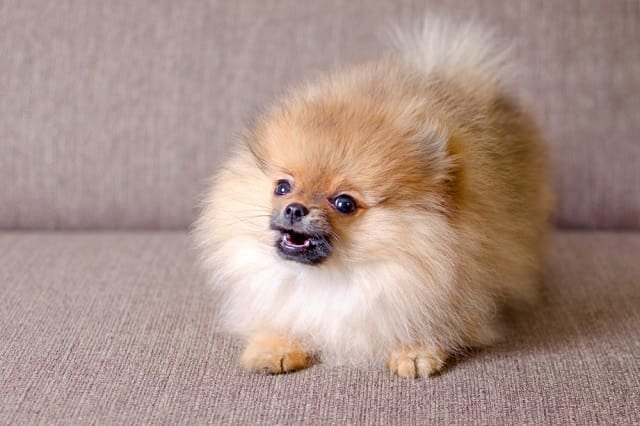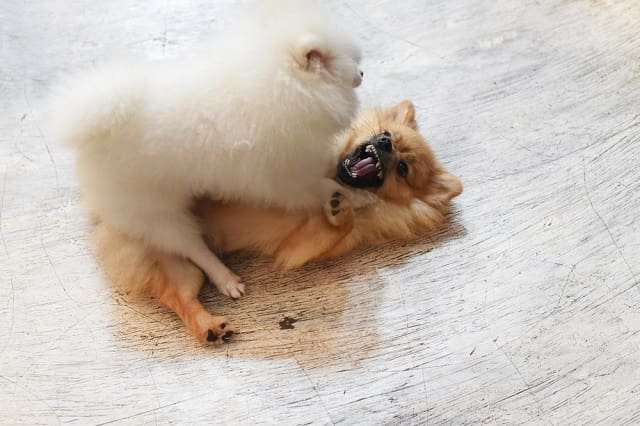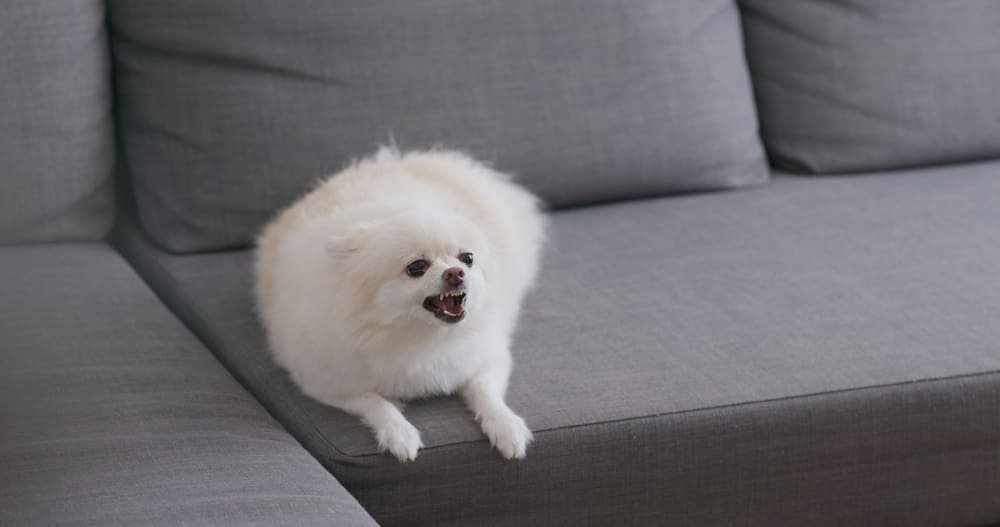Table of Contents
Are Pomeranians aggressive? This question often swirls around dog lovers and potential owners’ minds. With their fluffy fur and adorable tiny size, it’s easy to assume that Pomeranians are docile and friendly. But is there any truth to the notion that Pomeranians have a mean streak? This article will peel back the layers and delve into the truth behind this popular myth.
Understanding Pomeranian Behavior
Pomeranians are known for their energetic and spirited personalities, which can sometimes be misconstrued as aggression. However, it’s essential to understand that a dog’s behavior is shaped by various factors such as genetics, training, and environment. In reality, Pomeranians are not inherently aggressive dogs. Like any breed, their temperament depends mainly on their upbringing and socialization.
Pomeranians are generally friendly and affectionate dogs. They are known for being highly intelligent and eager to please their owners. They thrive on attention and love to be the center of attention in their human family. However, due to their small size, they may exhibit a certain level of fear or nervousness when faced with unfamiliar situations or people. Owners must expose their Pomeranians to various environments and socialize them early to help them feel more confident and comfortable in different situations.

Debunking The Myth: Are Pomeranians Aggressive
Despite their small size, Pomeranians are often mistaken as aggressive dogs. This misconception stems from a few factors, including their protective nature and how they may react when threatened or intimidated. Pomeranians have a strong sense of loyalty to their families and can be protective of their loved ones. They may bark loudly or exhibit defensive behavior when they perceive a potential threat. However, it’s important to note that barking or growling does not necessarily equate to aggression.
Aggression in Pomeranians is not a breed characteristic but a result of improper training, inadequate socialization, or mistreatment. Owners must establish clear boundaries and provide consistent training from an early age. Pomeranians thrive on positive reinforcement and respond well to reward-based training methods. Harsh punishment or neglect can lead to fear-based aggression or other behavioral issues.
Factors That Contribute To Pomeranian Aggression
Several factors can contribute to aggression in Pomeranians. One of the primary factors is a lack of socialization. During their critical developmental stage, Pomeranians not exposed to different people, animals, and environments may develop fear or aggression towards unfamiliar situations. Early socialization helps them become well-rounded and confident dogs.
Another contributing factor is inadequate training. Pomeranians are brilliant dogs that require mental stimulation and structure. Without proper training, they may become unruly or exhibit reactive behaviors. Consistent training and positive reinforcement are vital in shaping their behavior and preventing aggression.
Additionally, genetics can play a role in aggression. Some Pomeranians may inherit a predisposition towards aggression from their parents or ancestors. Responsible breeders prioritize temperament when breeding Pomeranians to minimize the risk of attack. Potential owners must research reputable breeders and choose a puppy from a healthy, well-tempered bloodline.
Signs Of Aggression in Pomeranians
Owners need to recognize the signs of aggression in their Pomeranians. Aggression can manifest in various ways, including growling, snarling, snapping, lunging, or biting. Pomeranians may display aggression towards people, other animals, or even objects. It’s crucial to address these behaviors early on to prevent escalation.
Some common triggers for aggression in Pomeranians include fear, resource guarding, territoriality, or lack of socialization. If you notice any signs of charge in your Pomeranian, it’s advisable to seek professional help from a certified dog trainer or behaviorist. They can assess the situation and guide you on effectively managing and modifying your dog’s behavior.

How to Prevent and Manage Aggression in Pomeranians
Preventing and managing aggression in Pomeranians requires a proactive approach from the owner. The following strategies can help promote a well-behaved and non-aggressive Pomeranian:
Socialization
Expose your Pomeranian to various environments, people, and animals from a young age. Gradually introduce them to new experiences and ensure positive interactions to build their confidence and reduce the risk of fear-based aggression.
Training
Provide consistent and positive reinforcement-based training to establish clear boundaries and expectations. Teach them basic commands and engage in mental stimulation to keep their minds occupied.
Early intervention
Address any signs of aggression or reactive behavior early on. Seek professional help if necessary to prevent the behavior from escalating.
Proper exercise and mental stimulation
Pomeranians are active dogs that require regular exercise to burn off excess energy. Engage in daily walks, play sessions, or agility training to stimulate them physically and mentally.
Positive reinforcement
Reward your Pomeranian for good behavior and appropriate responses. Use treats, praise, and affection to reinforce positive actions, encouraging them to repeat these behaviors.
Training and Socialization For Pomeranians
Training and socialization play a crucial role in shaping a Pomeranian’s behavior. Starting from an early age, exposing them to different people, animals, and environments is essential. Gradually introduce them to new experiences and ensure positive interactions. Enroll them in puppy kindergarten classes or obedience training to establish a solid foundation of basic commands and good manners.
Consistency is vital when it comes to training. Pomeranians respond well to positive reinforcement techniques, such as clicker training or using treats as rewards. Avoid harsh punishments or harmful reinforcement, leading to fear or aggression. Patience and persistence are essential, as training takes time and effort.
Socialization should be an ongoing process throughout your Pomeranian’s life. Regularly expose them to new situations, people, and animals to maintain their confidence and prevent fear-based aggression. Supervise interactions with children or unfamiliar dogs to ensure positive experiences. Positive reinforcement and rewards can help create positive associations with new encounters.
Common Misconceptions About Pomeranian Aggression
There are several common misconceptions about Pomeranian aggression that contribute to the perpetuation of this myth. One misconception is that small dogs are more aggressive than larger breeds. While small dogs can sometimes exhibit reactive behaviors due to fear or lack of socialization, aggression is not exclusive to any specific size or breed. It’s essential to evaluate each dog individually and not generalize based on size.
Another misconception is that Pomeranians are inherently yappy or aggressive towards strangers. While Pomeranians may be naturally alert and vocal, it is not a sign of aggression. They are known for their protective nature, which can manifest as barking or growling when they perceive a potential threat. However, with proper training and socialization, Pomeranians can learn appropriate behavior and respond positively to new situations.
Responsible Ownership and Proper Care for Pomeranians
Responsible ownership and proper care are essential for maintaining a happy and well-behaved Pomeranian. Here are some key aspects to consider:
- Regular veterinary care: Schedule routine check-ups and vaccinations to ensure your Pomeranian’s health and well-being. Regular veterinary care can help detect and address potential health issues early on.
- Proper nutrition: Provide a balanced diet that meets your Pomeranian’s nutritional needs. Consult your veterinarian to determine your dog’s best diet and feeding schedule.
- Grooming: Pomeranians have a thick double coat that requires regular brushing and grooming to prevent matting and maintain their appearance. Regular grooming sessions also provide an opportunity to bond with your dog.
- Exercise: Pomeranians may be small but require regular exercise to stay physically and mentally stimulated. Daily walks, play sessions, or interactive toys can help keep them active and prevent behavioral issues.
- Secure environment: Pomeranians are curious dogs, so creating a safe and secure environment is essential. Puppy-proof your home and ensure they have access to appropriate toys and chew items to prevent destructive behavior.
Conclusion
In conclusion, Pomeranians are not inherently aggressive dogs. Their behavior is shaped by various factors such as genetics, training, and environment. While they may exhibit protective or reactive behaviors, it is essential to differentiate between aggression and fear-based responses. Proper training, socialization, and responsible ownership are vital to preventing and managing aggression in Pomeranians.
If you are considering adding a Pomeranian to your family, it’s essential to understand their needs and commit to providing them with the care and attention they require. With the proper training, socialization, and love, Pomeranians can be wonderful companions and bring joy to your life. So, don’t let the myth of Pomeranian aggression deter you from experiencing the love and loyalty these adorable furballs have to offer.

